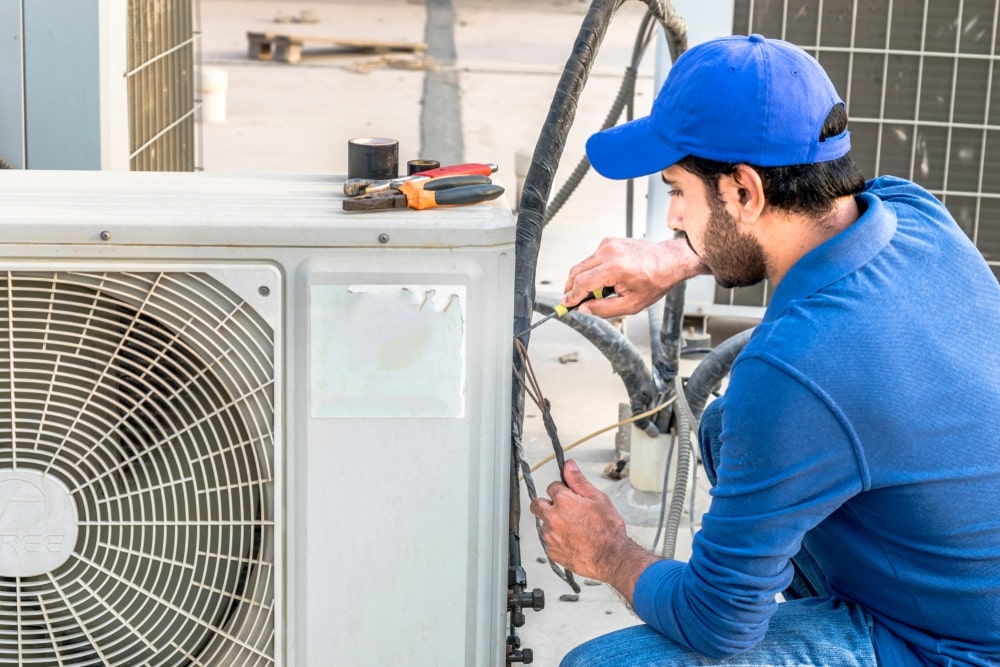The Study of Thermal Dynamics in HVAC

Air conditioning, commonly known as HVAC, plays a significant role in maintaining inviting indoor environments in both home and corporate spaces. As you move through any workspace, you might not think twice about the systems working quietly behind the scenes to ensure that the air is at a comfortable temperature and purity. However, comprehending the principles of thermodynamics that govern these systems can greatly enhance our ability to manage them efficiently.
In this manual, we will explore into the theory of HVAC, uncovering how these systems function and why they are essential. From fundamental concepts for newcomers to tips on effective maintenance and energy usage, we will discuss various aspects of HVAC systems. Whether you're considering an upgrade, looking to enhance indoor air quality, or simply wanting to minimize your energy bills, this text will provide the essential knowledge you need to make smart decisions about your heating and cooling systems.
Comprehending HVAC Technologies
HVAC, Cooling, and Air Conditioning , often referred to as HVAC, represents an important aspect used for ensuring pleasant conditions in indoor environments. At its heart, an HVAC configuration operates by controlling the temperature, moisture, and air standards of areas in houses and commercial facilities. It achieves this through a series of interconnected elements that perform the necessary functions of thermal management, chilling, and air circulation. Whether it’s a private setting or a big office facility, understanding how these mechanisms operate is crucial for efficient climate control.
The main elements of an HVAC setup include the heat source, cooling unit, air exchange system, and the temperature control. Warmth generation can come from different methods, including furnaces, heating pumps, or boilers, which generate heat during frigid months. For cooling, AC systems or devices like thermal pumps are employed to remove heat from indoor environment, creating a cool environment in the summer. Ventilation plays a vital role in ensuring clean air flows through the space, aiding to maintain air standards and get rid of suspended contaminants.

Furthermore, appropriate care is key to ensuring HVAC systems operate efficiently and remain operational over time. Routine inspections can pinpoint typical problems such as clogged screen filters or coolant leaks before they escalate into more major issues. Knowing how these mechanisms work not only enables residential managers and corporate leaders make informed decisions about operation and maintenance but also enables them to foster pleasant residential and professional environments year-round. spintax ### Common HVAC Issues and Remedies
Property owners often face a range of HVAC problems that can disrupt comfort and efficiency. One common issue is insufficient heating or cooling. This can occur due to a defective thermostat, blocked ducts, or low refrigerant levels. To tackle this problem, start by checking the thermostat settings and changing batteries if necessary. Next, inspect and clean air filters and ensure that vents are clear. If navigate to this web-site persist, it may be necessary to call a certified technician to inspect for refrigerant leaks or system malfunctions.
Another regular concern is excessive noise produced from the HVAC system. Noises like rattling, creaking, or buzzing can suggest various problems, from loose components to failing motors. Residents should first inspect the outside unit for any debris that might be causing vibrations and make sure all screws and fasteners are secure. If the noise is intense or ongoing, it is advisable to seek professional help to diagnose and resolve the underlying problem, as ignoring it can lead to more serious damage.
Finally, poor indoor air quality is an issue that many do not realize as directly related to HVAC systems. Problems such as dust buildup and allergens can stem from contaminated air filters or poor ventilation. To improve air quality, regular maintenance is essential, including frequent filter changes and duct cleaning. Installing air purifiers and choosing the right filters for your system can significantly enhance indoor air quality and overall well-being in the home.
Energy Effectiveness and Innovations in HVAC
The HVAC industry has witnessed substantial progress in energy effectiveness, primarily due to the increasing requirement for sustainable options. Modern systems are designed to maximize energy consumption while preserving comfort levels in residential spaces and business structures. Developments such as adjustable speed motors, sectioned heating and cooling, and advanced heat exchangers allow HVAC systems to function more optimally, reducing energy expenditure and reducing utility bills.
Intelligent automation implementation is another important advancement driving energy efficiency in HVAC units. Smart thermostats and home automation systems provide residents with unmatched control over their heating and air conditioning preferences. These tools can adapt to occupant behaviors, modify settings on their own based on occupancy, and provide instant energy consumption information, all contributing to a more effective HVAC operation. As intelligent gadgets continue to evolve, they will play an increasingly critical role in energy management.
Additionally, alternative energy solutions, such as solar-powered HVAC systems, are revolutionizing the field. These units harness solar energy to minimize reliance on traditional power sources, offering both ecological benefits and cost savings. Geothermal heating and cooling represents another innovative solution, utilizing the earth's constant temperature to provide effective climate control. As these solutions become more accessible, homeowners and businesses can make educated choices that align with their dedication to sustainability and resource conservation.
